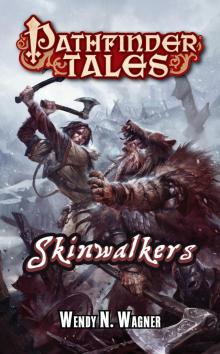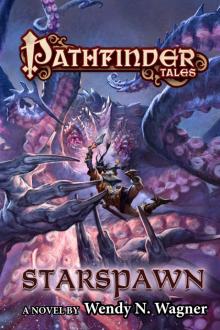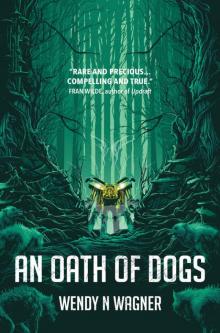- Home
- Wendy N. Wagner
An Oath of Dogs Page 2
An Oath of Dogs Read online
Page 2
In the nearest row of chairs, a couple was bickering. The woman was thin and angry. The man’s cheek showed the fractal scars of a silicate explosion. Leaving Huginn, then. Probably tired of trying to get by on the salary the lumber mill paid. Neither of the two spared an eye for the toddler sitting at their feet, idly unpacking a rolling suitcase.
Peter looked around for the new communications manager. He had no idea what she looked like. A tall black man waiting by the baggage carrel caught his eye, gave him a friendly nod, and returned his attention to his handset. Mark Allen, the company’s head of forestry, and thus, Peter’s boss. He was even wearing a suit to greet whichever company honcho was arriving on the next shuttle. Maybe Peter should have changed out of his field gear.
His eyes roved over the other people inside the small waiting room. A few families, a handful of obvious spacers looking uncomfortable in nearly a full g, and a good-looking woman standing at the ticket counter, her hand resting on the head of a big white dog.
A dog. He hadn’t seen a dog since his last trip to his grandmother’s house. They were common enough on the rest of Huginn, but not in Canaan Lake.
He thought of the muddy bone he’d dropped off at the police station this morning and had a mental shudder. No, dogs weren’t common in Canaan Lake.
He jammed his hands in his pockets and studied the arrival boards. As usual, half of them were burnt out.
“Are you Dr Bajowski? The guy at the ticket counter said you were from Canaan Lake HQ.”
He whipped his head around. The good-looking woman with the dog was standing beside him, her hand out. There was an odd quality to her smile, as if perhaps the right side of her face was made out of stiffer skin than the other. He realized he was staring, and freed his hand from his pocket to shake.
“Kate Standish,” she said. Her cropped hair stood up in messy spikes, and under her black leather-looking jacket, she wore what looked like a man’s white tank top. “You look more Mexican than Polish.”
He released her hand quickly. “So there’ve been some changes while you were in transit. There was an accident, and well, long story short, you’ve been promoted to communications manager. Congratulations, Kate.”
“Standish,” she corrected him. “What happened to Duncan Chambers?”
Peter let his eyes crawl from the woman’s boots up to her face. She didn’t look like a spacer — she didn’t have the attenuated frame or the translucent hide that came from life under artificial lighting — but using last names was a spacer convention. On her, it seemed like an affectation.
“I grew up on Earth, but I served at Goddard Station for five years,” she said. “That’s why I’m not seven feet tall. I guess I deserve that look for the Mexican comment.”
“Yeah,” he said, drawing it out into two syllables. He couldn’t read her, couldn’t get a fix on her personality. Prickly, that was for sure. And the dog had come closer while they were talking. It watched him with what seemed like a friendly expression. “Is that your dog? Can you have a dog on a space station?”
“I got Hattie after that stage of my life. Dogs and low-g don’t really go together. Can we get my luggage? And explain about Duncan? I was looking forward to working for him.”
He pointed out the baggage drop at the far end of the building. There was no good way to tell her about Dunc. She kept glancing over at him, and he wondered if he looked as uncomfortable as he felt. “There was an accident,” he began, but a piercing giggle cut him off. They both turned to see what made the noise.
A grubby kid, probably two years-old, maybe younger, raced at top speed toward Hattie and grabbed hold of her soft tail. Hattie stood patiently.
“You can pet her,” Standish said.
“Don’t touch that thing!” The toddler’s mother snatched up the kid. It was the angry woman he’d seen earlier, the one whose husband had the scarred face.
“She’s perfectly trained,” Standish answered before Peter could open his mouth. “And she has a docility chip — she couldn’t bite if she wanted to.”
The woman said nothing but backed away, staring at the dog.
“Jesus. What’s wrong with that bitch?” Standish grumbled.
Peter gave the woman a friendly smile and turned back to see Standish hauling her bags out of the baggage trough. He wanted to ask her more about the dog, which was sniffing his crotch, perfect training or not. He turned his body away from the inquisitive snout. “Can I take one of your bags?”
“That would be great. The company said my lodgings are furnished, so this is pretty much everything I own. You’ve got the coffee pot in that suitcase, so be careful.”
He led her toward the exit and stopped on the black mat. Outside the rain drilled down hard enough to ricochet off the pavement, giving the illusion that water shot up from the ground at the same time it fell from the sky. The water hazed the air in silver sheets.
“Do you have a rain coat?”
“Somewhere in my bags. Do you think I’ll need it?”
He gestured at the glass doors ahead. Through the curtains of rain, the parking lot was a black field surrounded by the green fingers of young horsetail trees. Standish stared outside a long moment, and then reached out to the dog and curled her fingers around its red leather collar.
“Didn’t they warn you about the rain?” They obviously hadn’t told her about dogs. He wasn’t sure how to break the news.
“They said—” She broke off and cleared her throat. “They said it rained a lot. I guess I wasn’t prepared for how wet it really was.” She knelt to rifle through a pack and came up with a sturdy jacket. “I guess there’s a difference between hearing it and seeing it.”
“Well, hoods up. My rig is the closest — that white company UTV.” He stepped out from under the wide awning, but Standish didn’t move off the black mat, staring outside. The dog leaned comfortingly against her leg.
“Kate.”
She blinked at him.
He corrected himself. “Standish. It’s just a few meters to the car.”
She took a small step forward, then picked up her pace. Peter threw open the passenger door and slid her suitcase across the backseat. She slung her pack past him and motioned for the dog to jump in after it.
Peter ran around to the driver’s seat. He didn’t look at Standish as they settled into place, concentrating instead on drying his glasses and finding his seat belt, but he could hear her ragged breathing, as if she’d run a klick instead of just the few meters across the parking lot.
He risked a glance at her and saw she was shaking. “Are you sure you’re OK?”
“A-fucking-OK.”
“OK.” He started up the rig and pulled out onto the highway. Maybe they could just not talk until they got to Canaan Lake. It might be better. She put her boot up on the dashboard and fiddled with the laces.
Then he remembered he still hadn’t explained about Duncan. His heart sank. “Yeah, so about Duncan Chambers. He… This sucks. You’re going to have to be the new Duncan.”
“What?”
“Dunc’s dead.” Saying it like that made Peter wince. “He went out one night about a month and a half ago, and he never came back. By the time we realized something had happened, it was too late. Huginn’s a wild place. If you forget that you could be in real danger.”
“Jesus. You’re sure? I mean, couldn’t he have just gone back to Earth?”
“His passport was never activated. Anywhere. He liked to hike, so…” He cleared his throat. “Anyway, search parties looked for him for a week before the weather got too bad.” Peter had kept looking for weeks afterwards, but he didn’t need to tell her that.
She sat for a minute without talking. The left side of the road went bright as they passed a long swathe of clear-cut hillside, the pale yellow soil raw and naked between the strips of greenery. Then she blurted out, “Songheuser made this place sound so magical. Like everything’s something out of Wonderland. Giant ferns, pink caterpillars. Fungus t
hat’ll dance to music. I should have known it was too good to be true.”
“Well, there’s some bad stuff — red death puffballs, for example, which will rip your lungs into goo within twelve hours — but you can learn how to avoid it, by and large.”
The UTV rounded a corner and Peter braked hastily. “Plus, it’s still pretty much Wonderland.”
Standish’s mouth fell open. “What are those things?”
Three creatures the size of sheep, roughly the same design as a potato bug but tinted the colors of rainbow sherbet, made their slow way across the road.
“Greater trudgees. We call this ‘rush hour in Huginn.’” He pointed ahead. “They like the highway because of all the exposed rock. See where they’re going?”
She rolled down the window to follow his gesture. She stared at the rock field beside the highway, which stretched at least fifty meters before the rocks began to form the slope of a steep hill. Nearly every centimeter had been claimed by rock-eater lichen. Its orange and pink tendrils wrapped the rocks like a net, clashing with the chartreuse spots of Devil’s bogey and the shimmering rainbows of Huginn’s puffball. A few trudgees were already making their slow nibbling way among the rocks.
“Wow.” She scrambled to kneel on her seat so she could lean out the window. “So many colors. It’s hard to believe.”
“Fungi and spore plants fill most niches around here. The chemistry behind all the colors is complicated, but Songheuser is hoping to identify the pigments and use them in new dye technology.”
She flopped back into her seat. “You don’t sound like you approve.”
He brought the UTV onto the highway. “If they cultivate the mushrooms in a contained facility, I think it’s a good idea.”
“You’re very careful with your words, aren’t you?” She rolled her window up. The worst of the condensation had cleared, but now dense stands of horsetail and fern hemmed in the road, and there were no colors to point out. “What do you really think?”
“I think harvesting these fungi in industrial quantities could cripple the local ecosystem,” he answered, with unanticipated force. “Rock-eater lichen breaks rock into nutrients vital to plants, and the other fungi are critical recyclers. With this much precipitation, nutrients are leached from the soil faster than plants can absorb them. If we want to keep harvesting horsetails — and let’s face it, horsetail lumber is Songheuser’s biggest moneymaker on this planet — then they’d better find a way to help the fungi grow, not rip it all out.”
He paused for air and realized he was talking too loud and too fast. “Sorry.” He had to get smarter. After all, Kate Standish worked for Songheuser, too.
“Sorry you have thoughts and ideas that you care about?” Standish shook her head. “I owe the company a lot, but I came here to get away from all that apathetic bullshit back on Earth.”
“Well, people there don’t have much.”
“Because people live in cans down there, that’s why. Back on Earth, all those cramped cities — how can you care about any of it? I didn’t. The only good thing I ever got on Earth is Hattie.”
Peter scratched the back of his neck. “There’s something you should know about Hattie.”
The smile faded from Standish’s face.
“Most folks in Canaan Lake aren’t fans of dogs. In fact, there aren’t any li—”
“I checked,” she cut him short. “Dogs aren’t illegal. Farmers are even looking for breeding bitches. Hattie’s fixed, of course, but she’s perfectly legal.”
“There’s no law,” he said. “There’s just a local thing about dogs. They run away.” He hesitated. “Or get lost. But mostly they run away and go wild.”
They rounded a corner and eased aside to let a log truck pass. They’d made good time cutting through the gentle hills around Space City, and now they were nearly to Canaan Lake. He slowed the UTV as the highway rounded the steep flanks of Mount Hepzibah.
“They ‘go wild’?” Standish snapped. “You mean people just turn their dogs loose in this kind of country? For Chrissake, that’s the stupidest thing I ever heard. What could a dog even eat on this planet? Every goddamned thing is poisonous.”
“There’s livestock. Huginn has the largest population of sheep, cows, and goats in two star systems. The Believers of the Word Made Flesh have turned this area into a major agricultural center, and their people are pretty damn possessive of their livestock.”
“I forgot,” she admitted. “I’d read about the farms and the Church, but I never thought about the animals. I don’t get it, though. I know Believers, Bajowski. I got Hattie from a Believer breeder — there’s hardly anyone on Earth raising dogs besides the Believers. They’re dog people.”
“Not here,” he said. “Canaan Lake’s not like Earth, or anyplace else. The people who live here do things their own way.”
They passed by the sturdy wooden gate of a farmhouse. Peter watched Standish study it, craning her neck around until they had passed out of sight. He was used to the way Believer farms looked on Huginn: the unpeeled horsetail trunk fences, the severe white houses, the pole barns. It reminded him of pictures of Amish country in Pennsylvania. The ornate and colorful crosses painted on the barn doors only added to the image.
She turned back around in her seat and stared at the battered toes of her black boots. “It’s nothing like Earth,” she murmured. She must have never made it to Pennsylvania.
He slowed the vehicle further. In a minute, Cemetery Hill would pop up, and she ought to see it. If anything would underscore the strangeness of this place, it was the graveyard.
“Look.” He eased the UTV onto the shoulder of the road.
Cemetery Hill stood tall and proud, one side bordering Canaan Lake’s posher neighborhoods — such as they were — and its other climbing up from the highway. Its steep flanks stood neatly terraced and landscaped, and gray cement paths alternated with green grasses imported from Earth. It was the colors that set it apart from any cemetery back on Earth.
“Holy shit,” she breathed.
He’d had the same response the first time he saw it. He’d been to a cemetery or two — he’d buried his grandmother, after all — but those cemeteries were crowded little places with strict rules against headstones. The Believers had retained the headstone tradition, or resurrected it, perhaps, and they had given it their own strange touch. At the head of every grave stood a me memeter-high slab of stone with complicated artwork and lines of Biblical verses. Small blue statuettes, something like the figure of the Virgin Mary, sat beside several of these lavish headstones. And at the foot of every grave stood a hand-painted cross, the blond horsetail wood emblazoned with red and blue and yellow designs. Ordinary settlers had much plainer crosses and headstones, but it was clear to Peter that the Believer colonists had influenced even these burial plots.
“So many crosses,” she said. She rolled the window down again and stuck her head out.
“At least one on every grave,” he said. “The wind blows them down, but the Believers come out every couple of months and replace them.” He’d found a broken cross laying in his yard one morning, and he lived in company housing all the way down by the lake.
She pulled her head back inside. “Why have so many people died here?”
“Most of the graves belong to Believers,” he explained. “They allow basic surgical techniques and even some drugs, but they won’t go to the hospital in Space City. If someone seriously gets hurt, they don’t always pull through.”
“Stupid.” She frowned. “Who’s that up there?” She pointed toward the top of the hill where a man was digging.
“That’s Caretaker Frank.” Peter twisted around in his seat to offer Hattie his hand to smell. He gave her ears a rub. She was such a pretty dog, and so well-behaved. “Remember what I said about dogs running wild?”
Frank planted his shovel and trudged toward a wheelbarrow covered in canvas. He pushed the wheelbarrow closer to where he’d been digging, and dumped the load,
canvas and all, into the hole. Peter wondered if the bone he’d found by the lake this morning belonged with it.
“What about them?”
“It doesn’t seem to matter what people do, they can’t keep those dogs from digging in the graveyard. It’s the smell, I guess. Something to eat.”
Standish rolled up her window. “That’s sick.”
He nodded and started up the UTV again. Up ahead, the slate-colored waters of Canaan Lake appeared. Soon he’d be pulling into the driveway of the shabby house she’d inherited, like her job, from Duncan Chambers — the man who’d brought him to Huginn, his ex-lover, his best friend for fifteen years. He glanced at Kate Standish, quietly watching the town appear, her left hand stroking the big white dog. Duncan had said he thought Peter would like her.
Time would tell, he supposed. He held back a sigh. Damn, he missed Dunc.
STANDISH MOVED from window to window, closing the curtains and slapping shut the blinds. The bathroom lacked such amenities, but at least a dense stand of ferns pressed up against the side of the building. It was surprisingly comforting. Hattie took a deep sniff of the toilet’s base and made a whuff.
“Are you hungry, Hattie?”
The dog pricked up her ears. To minimize air sickness upon landing, the attendants had closed off the dining areas six hours before the shuttle hit Huginn’s atmosphere, and between the wait and the drive from Space City, it had been a long time for the dog to go without food. After the winding roads and open spaces, even water sounded vaguely horrible to Standish. But Hattie might want lunch.
Standish left the bathroom’s pleasant green view and sank down on the battered couch where she’d dropped her pack. The furnishings were the same style as the exterior: disinterested corporate cheap. Every house on the lake shore was the same squat plastic box, probably shit out by the same construction printer as every other company town. Standish had been working off-planet for more than a decade. She’d seen enough to know that even the brand new space stations looked scuffed and unloved. She zipped open the pack, took Hattie’s heavy plastic bowls and a packet of dog chow out of the top layer, and sighed.

 With Perfect Clarity
With Perfect Clarity Pathfinder Tales: Skinwalkers
Pathfinder Tales: Skinwalkers Starspawn
Starspawn An Oath of Dogs
An Oath of Dogs